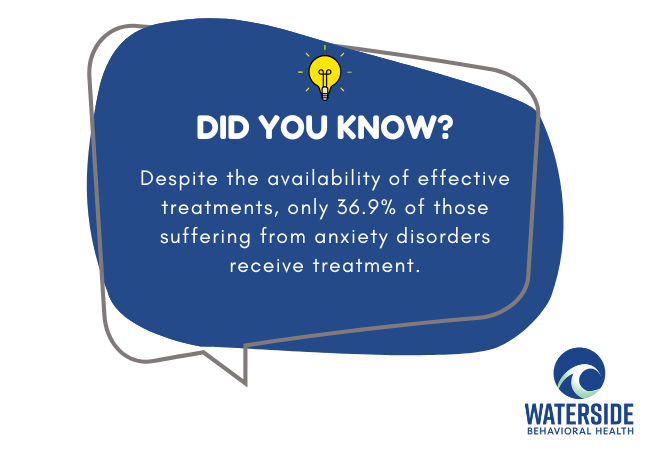Anxiety is one of the most prevalent mental health conditions in the world, and it takes many forms. Among the most common are social anxiety disorder (SAD) and generalized anxiety disorder (GAD). While both are rooted in excessive worry and emotional distress, they are distinct conditions that require different approaches to diagnosis and treatment. Understanding the differences between social anxiety and generalized anxiety is essential for individuals seeking help, as well as for loved ones who want to offer support.
This blog explores the key differences between social anxiety and generalized anxiety, the unique challenges each presents, and the evidence-based treatment options available for both.
Understanding Social Anxiety
Social anxiety disorder, also known as social phobia, is characterized by an intense fear of social situations where a person believes they will be judged, embarrassed, or humiliated. These fears go beyond mere shyness. They can interfere with everyday interactions like making eye contact, eating in public, attending meetings, or speaking on the phone.
Individuals with social anxiety often anticipate negative outcomes even before entering a social setting. This can lead to avoidance behaviors that reinforce the anxiety and isolate the individual from meaningful relationships and experiences.
Unlike generalized anxiety, which tends to focus on a wide array of concerns, social anxiety is tightly linked to interpersonal scenarios. It can be triggered by specific situations or even the mere thought of being watched or criticized.
Understanding Generalized Anxiety
Generalized anxiety disorder is more diffuse and persistent. People with GAD often worry excessively about various aspects of life—health, finances, family, work, world events, and more. These worries are often disproportionate to the actual likelihood or severity of the feared events.
The symptoms of GAD extend beyond mental preoccupation. They often manifest physically, including tension headaches, gastrointestinal issues, restlessness, insomnia, and fatigue. Unlike the focused fear of social interactions in social anxiety, GAD creates a constant state of worry that can affect every part of daily life.
People with GAD often struggle to “turn off” their anxiety, even when there’s no immediate cause. This relentless worry cycle can significantly affect concentration, mood, and overall quality of life.
Key Differences Between Social Anxiety and Generalized Anxiety
While both disorders involve persistent anxiety, several distinguishing features separate them:
-
Nature of the Fear: Social anxiety centers around fear of social judgment, while GAD involves chronic worry over a range of everyday concerns.
-
Situational vs. Constant: Social anxiety is situational and triggered by specific environments; GAD is often persistent and general.
-
Avoidance Behavior: Social anxiety leads to the avoidance of social situations. GAD sufferers may not avoid situations but may experience overwhelming worry regardless.
-
Physical Symptoms: GAD is more likely to produce physical symptoms such as muscle tension, sleep problems, and gastrointestinal distress.
It’s also not uncommon for individuals to experience both disorders simultaneously, which may intensify symptoms and complicate treatment.
How Social Anxiety Impacts Daily Life
Living with social anxiety often means shrinking one’s world to avoid fear-inducing scenarios. School, work, and relationships can become daunting challenges. For example, someone with SAD might avoid job interviews despite being qualified, or they may skip social gatherings out of fear they’ll say the wrong thing.
This fear of judgment or humiliation often results in self-criticism and negative self-talk, perpetuating a cycle of avoidance and emotional distress. Over time, this can lead to isolation, low self-esteem, and even secondary conditions like depression.
Because of this interplay, many individuals seeking depression therapy in Massachusetts may also be evaluated for co-occurring anxiety disorders like social anxiety.
The Effects of Generalized Anxiety on Functioning
Generalized anxiety, on the other hand, may not limit someone’s social interactions, but it can dramatically reduce their quality of life. The constant internal narrative of “what if” makes it difficult to concentrate, relax, or feel emotionally safe. Even when life is objectively stable, individuals with GAD may feel stuck in a loop of anticipation and worry.
GAD may also cause fatigue and burnout due to the sheer mental energy spent worrying. It can impair work performance, affect relationships due to irritability or tension, and lead to chronic health issues because of long-term stress.
Mindfulness and grounding techniques can help reduce the mental noise caused by both social and generalized anxiety, but for many, these strategies are not enough on their own. Professional help provides a structured pathway to recovery.
At a mental health treatment center in Massachusetts, treatment plans are tailored to meet the unique needs of each client, accounting for the type and severity of anxiety and any co-occurring conditions.

Therapeutic Approaches for Social and Generalized Anxiety
There’s no one-size-fits-all method for treating anxiety, but certain therapies have consistently proven effective:
Cognitive-Behavioral Therapy (CBT):
CBT is widely regarded as the gold standard for treating both GAD and social anxiety. It helps individuals recognize and change negative thought patterns that fuel anxiety. For example, in treating social anxiety, CBT may focus on challenging fears about judgment or embarrassment. In GAD, CBT targets the tendency to catastrophize everyday concerns. Many individuals find lasting relief through Cognitive-Behavioral Therapy in Massachusetts offered in structured outpatient or residential programs.
Dialectical Behavior Therapy (DBT):
Initially developed for borderline personality disorder, DBT has shown strong results for anxiety as well. It integrates mindfulness and emotional regulation, helping clients cope with distress in healthier ways. Many mental health treatment programs in Massachusetts incorporate Dialectical Behavior Therapy in Massachusetts to help individuals tolerate discomfort without resorting to avoidance behaviors.
Exposure Therapy:
Especially useful for social anxiety, exposure therapy involves gradual, controlled exposure to anxiety-inducing scenarios. Over time, this helps desensitize the individual and reduce fear responses. It’s a highly structured process and should be guided by trained professionals.
Medication Management:
In some cases, anxiety symptoms may be severe enough to warrant medications such as SSRIs or SNRIs. These are typically used in conjunction with therapy and are carefully monitored by mental health professionals to ensure effectiveness.
Holistic Therapies:
In addition to talk therapy and medication, many individuals benefit from adjunct therapies like art therapy, yoga, breathwork, and mindfulness practices. These tools help individuals reconnect with their bodies and foster calm in daily life. Holistic support can also be vital for individuals recovering from trauma, which is why trauma therapy in Massachusetts often includes these modalities.
It’s important to know that anxiety rarely exists in isolation. Many people also experience co-occurring conditions like depression, substance use disorders, or past trauma. This complexity is why integrated, personalized care at a mental health treatment center in Massachusetts is critical for long-term healing.
Why Choose Waterside Behavioral Health?
At Waterside Behavioral Health, we understand that anxiety can feel like a constant, overwhelming presence—whether it shows up in specific social interactions or lingers throughout the day without warning. That’s why we provide more than just treatment; we provide an experience of healing that honors your unique story.
Our approach is rooted in compassion, science, and a deep respect for each individual’s needs. We take the time to understand whether you’re facing the distress of social anxiety, the persistent worry of generalized anxiety, or a combination of both. Each client receives a personalized care plan built around their specific symptoms, lifestyle, and goals. Whether you’re just beginning to explore therapy or you’ve tried multiple avenues without success, our team meets you exactly where you are—without judgment.
Our clinicians include licensed therapists, psychologists, and medical professionals who specialize in anxiety disorders and co-occurring conditions such as depression, trauma, or past substance use. With access to evidence-based therapies like CBT and DBT, alongside holistic support including mindfulness, art therapy, and movement-based modalities, we help you build resilience from the inside out.
Our warm, inclusive environment fosters both comfort and growth. You’re not a number here—you’re a person with a story, and we’re here to help you rewrite it. We’re deeply committed to walking beside you, one step at a time, as you move from survival to confidence, and from isolation to connection.
Conclusion
Both social anxiety and generalized anxiety can make the world feel smaller, heavier, and harder to navigate. But you don’t have to face these challenges alone. With understanding, support, and the right treatment, it’s possible to regain a sense of calm, reclaim your confidence, and build a more connected, empowered life.
At Waterside Behavioral Health, we’re here to help you take that first step toward change. Whether you struggle to enter social situations or find your mind constantly racing with worry, there are proven strategies and therapies that can help. We’ll work with you to uncover the root of your anxiety, reframe harmful thought patterns, and help you create lasting tools for self-regulation and peace of mind.
If you’re ready to start that journey, reach out to us today at (774) 619-7750. Healing begins with a conversation—and we’re here to listen.
Frequently Asked Questions (FAQs):
What is the main difference between social anxiety and generalized anxiety?
Social anxiety is triggered by fear of social judgment or embarrassment in social settings, while generalized anxiety involves chronic, excessive worry about a wide range of everyday concerns, even in the absence of a clear stressor.
Can someone have both social anxiety and generalized anxiety at the same time?
Yes, it’s common for individuals to experience both conditions. When they co-occur, it often leads to more intense symptoms and may require a more tailored treatment plan.
What treatment options are available for anxiety in Massachusetts?
Treatment options include evidence-based therapies such as cognitive-behavioral therapy (CBT), dialectical behavior therapy (DBT), medication, mindfulness practices, and holistic approaches. Waterside Behavioral Health offers these services through our mental health treatment programs in Massachusetts.
How do I know if I need professional help for anxiety?
If anxiety begins to interfere with your daily life—whether at work, in relationships, or in your ability to feel at ease—it’s a sign to seek professional support. Persistent symptoms that last more than six months are also a clinical indicator.
Does insurance cover anxiety treatment?
Many insurance plans cover outpatient mental health treatment, including therapy for anxiety disorders. Our admissions team can help you verify your benefits and explain your coverage options.
What should I expect from my first therapy session?
During your first session, you’ll speak with a therapist about your symptoms, experiences, and goals. It’s a judgment-free space designed to help you feel understood and supported as you begin the process of healing.




